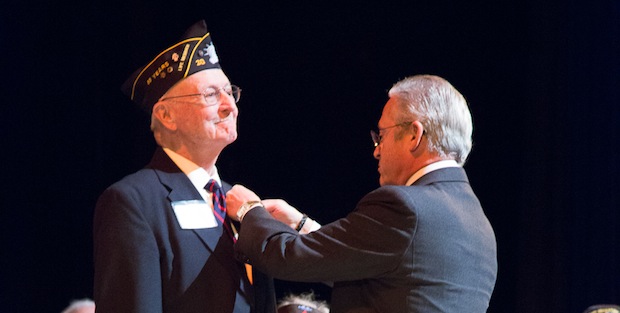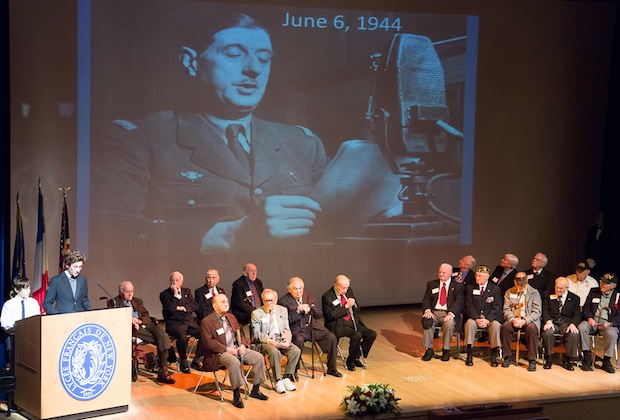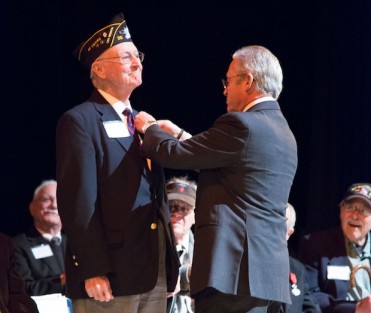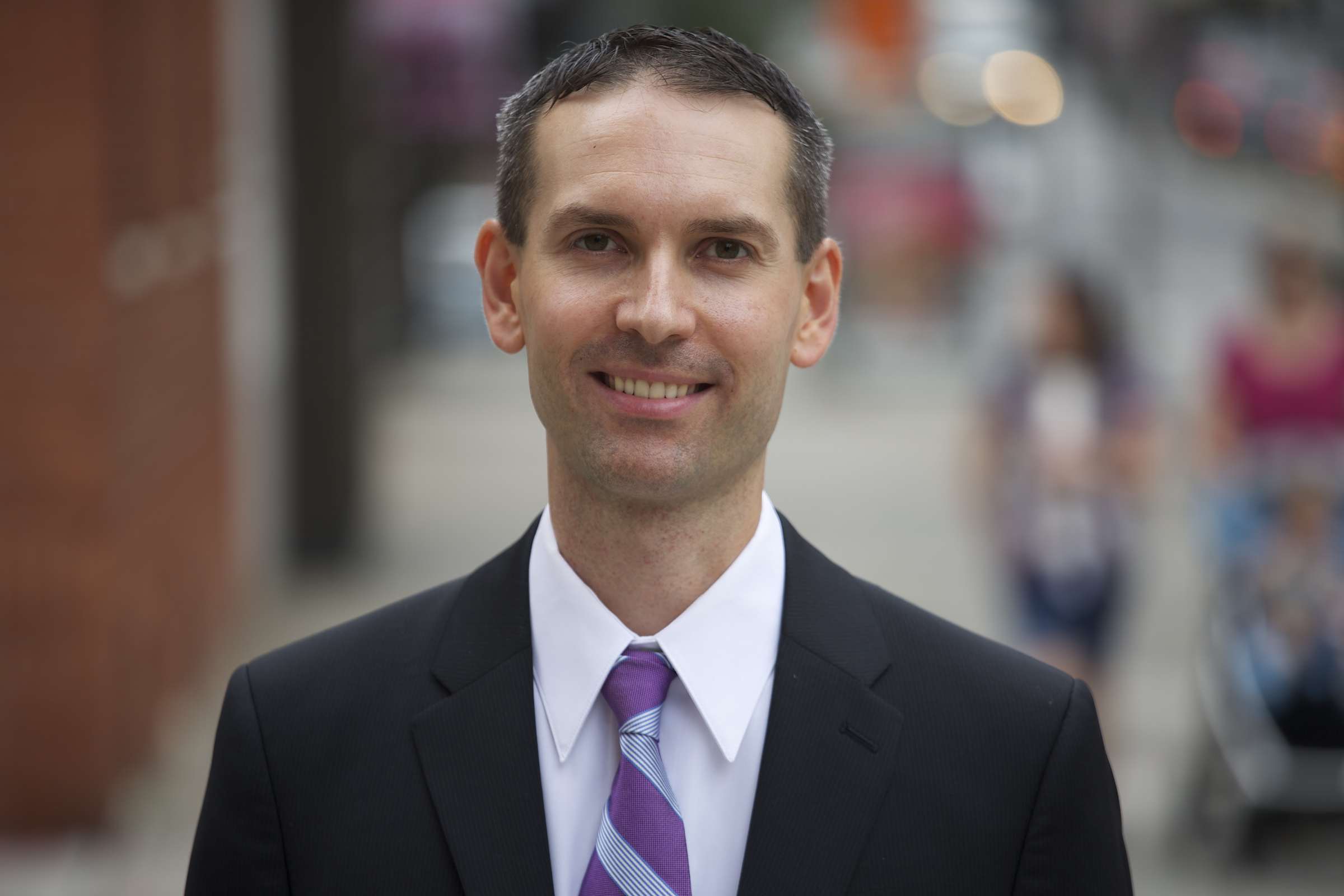On November 8, the Lycée Français de New York hosted a ceremony honoring 35 American veterans of World War 2 who were promoted to the French Legion of Honor for their service to France. The award has a prestigious history since its creation by Napoleon Bonaparte. Among its distinguished recipients was General Dwight Eisenhower. Watch the video of the ceremony.
Our Y9 classes study World War 2 so the ceremony presented an opportune history lesson for our students. Lycée students presented each veteran individually during the event. Some students were fortunate enough to interview a few veterans in advance.
We are happy to share with you excerpts from their reflections on what they learned from their brief interviews with these living witnesses of World War 2. These reflections are part of a history project that they are completing with assistance from American veterans.
19 veterans received the French Légion d’Honneur during the last November-11 ceremony in 2012 that took place at the Lycée Francais.
Before sharing my reflection, I would like to thank my teachers and everyone else involved. I want to thank them for this amazing experience and honor. I honestly think it is an honor to meet a national hero such as a Veteran. I received correspondence from a veteran who served in WWII as a paratrooper for the 17th Airborne Division. His story has expanded my knowledge of WWII.
I learned that even young men still studying in university to earn a degree were drafted. He was a sophomore at Rutgers University before he was drafted. He left his studies and put on hold his education to serve his country. He gave up a possible future for himself to go to war. I find this act particularly heroic in the sense that this man put others before himself. What I find most influential is that that so many young men’s first experiences of the outside world was through a war. This is shocking to me because it is so easy for us to travel today due to the advancement of technology. Traveling, for the majority of us is for vacationing and amusement not for war. In his account, he discusses how the movies and stories told about WWII are accurate but that they leave out the day to day activities while focusing on the emotional parts of the war. He also explained how he chose to forget his wartime experiences.
This particularly affected me because it suggests what horror he might have seen during the time he served. However, he also met friends during this time that he will never forget. This veteran was only 19 when he went into service which caused him to become a man faster than any 19 year old is supposed to, “I matured during my 3 years in the military.” One can only imagine that there is a big difference between the average modern 19 year-old and the veterans who were learning at such a young age the meaning of life and death. In my opinion, he is a true hero who is glad to have served his country and I quote, “I would not change anything if I had the chance to do so.” He is proud to be able to call himself an American soldier and wouldn’t change anything about his past. My assigned veteran’s story has truly moved me and I am glad to have had the opportunity to learn more about WWII.Iman F.
Guy Wildenstein, President of the American Society of the French Legion of Honor, rewards an American Veteran.
I interviewed a veteran who was 18 years old and was a few months from finishing high school when he was drafted, and arrived in Marseille. From Marseille he took a “40 and 8” (a train which accommodates 40 men laying on the floor, or 8 horses) for 4 days and 5 nights going to the front line through France. There was a snowdrift of 7 feet, up to the boxcar door. They arrived at the front line, quite miserable and very cold. In Epinal, he was always wet, as he would always jump in puddles of water when getting out of the truck. He froze three toes on each foot, although not completely, but they stayed partially numb. He was a field line man in the artillery, laying telephone wires as communication between the observation post on the front line, and the artillery: someone close to the German lines would observe the German position and call the artillery to set fire. As he recalls: “At 18 years old, the advantage is you have no fear, you are not too bright, and you don’t think that much.”
Julie G.
I learned from my veteran that the war is really hard; even though we already knew it from our teacher or some books, it is not the same thing when a hero tells it from his point of view. I also learned something that books could not tell it to us. Even though the war is one of the most horrible things that could have happened, it is an experience that can shape character. The third of June 1944, he left for the invasion he was called called back due to a poor weather . He finally arrived in France in a crawl space of the engine. My veteran said that he was “fortunate to have been involved in an important part of the invasion and can only feel proud.” I also learned that the war helped him to improve the leadership qualities in him. We think that the people who participated in wars will never would like to do it again but if someone knows actually what war means, then he might serve again.
Yomna M.
A couple weeks ago I wrote a letter to one of the veterans who is receiving the Legion of Honor. This man is a veteran who served as a Marine Officer. In his letter I learned about his life of becoming a soldier and fighting in battle with the French in War. He first started off as a college student going to Pennsylvania State College, when he was introduced to the War. He enlisted in the V-7 program that let him graduate and then joined the United States Navy. After going through training and living in different Navy bases in Plymouth he had his own boat and crew but he knew very little of them. He and his team set off to Omaha.
The veteran tells us how hard it was to penetrate the German lines. He also explained that the American troops had very little contact with the French because it was a strict military operation. In August, he was sent to Cherbourg. He describes Cherbourg as a “ different life there.” The soldiers and officers were more friendly. He said that it should have been like this from the start. He told me that he sometimes has memories and images of young soldiers being crushed up by a propeller. The war did not affect him, except that the child soldiers he played with did not come back.Matthew F.
About the Author :
Arthur Plaza holds a Ph.D in History and French Studies from New York University. He also studied at Sciences-Po and was awarded a Fulbright Fellowship to conduct research in France in 2004-2005. Part of his research was published in the collective volume entitled “Politiques de la laïcité au XXe siècle” (PUF, 2007). In addition, he has been an editorial assistant at the scholarly journal, French Politics, Culture & Society.




